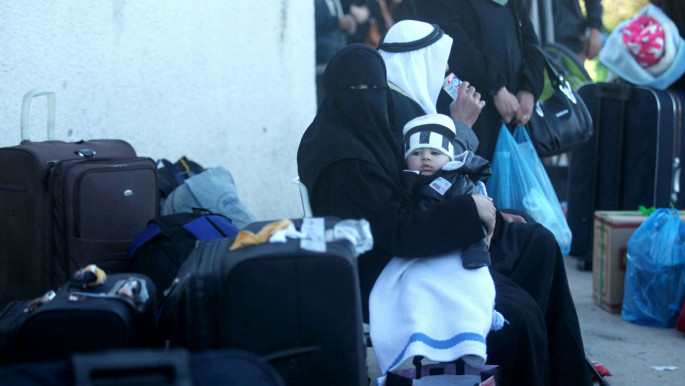A honeymoon for Gaza, but now it's over
A honeymoon for Gaza, but now it's over
Feature: Egypt's 2011 revolution had a knock-on effect in Gaza as ties warmed between Hamas and Egypt's new president, Mohamed Morsi. But that soon changed.
4 min read
On the Gaza side of Rafah, three men sit together to remember the "honeymoon" period the Strip enjoyed after the revolution in Egypt.
The 25 January revolt against Hosni Mubarak and election of Mohamed Morsi as president was a boon for border trade. Morsi, an ally of Gaza's ruling Hamas movement, eased restrictions introduced by Mubarak after Hamas' election in 2006. Egyptian authorities turned a blind eye to much of the smuggling trade that passed through tunnels and across the border. For a brief time, it was possible for Gazans to get fast food delivered from Egypt.
However, an aggressive reversal of policy has taken place since Morsi's fall in 2013.
"Since President Abdel Fattah al-Sisi came to power in June 2013, we have been hardly getting by. I have lost about $500,000," says Abu Mohammad, who once operated a smuggling tunnel. "Egyptian authorities have begun blowing up tunnels."
Almost on cue, a loud explosion was heard from the 500m-deep "buffer zone" set up on Egyptian side of the border.
"This is a sound of one more tunnel being destroyed by the Egyptians. More than 500 tunnels have been so far destroyed," he says. "I used to bring lots of materials into Gaza such as building materials and food. But now, nothing."
The 25 January revolt against Hosni Mubarak and election of Mohamed Morsi as president was a boon for border trade. Morsi, an ally of Gaza's ruling Hamas movement, eased restrictions introduced by Mubarak after Hamas' election in 2006. Egyptian authorities turned a blind eye to much of the smuggling trade that passed through tunnels and across the border. For a brief time, it was possible for Gazans to get fast food delivered from Egypt.
However, an aggressive reversal of policy has taken place since Morsi's fall in 2013.
"Since President Abdel Fattah al-Sisi came to power in June 2013, we have been hardly getting by. I have lost about $500,000," says Abu Mohammad, who once operated a smuggling tunnel. "Egyptian authorities have begun blowing up tunnels."
Almost on cue, a loud explosion was heard from the 500m-deep "buffer zone" set up on Egyptian side of the border.
"This is a sound of one more tunnel being destroyed by the Egyptians. More than 500 tunnels have been so far destroyed," he says. "I used to bring lots of materials into Gaza such as building materials and food. But now, nothing."
| Read more of al-Araby's special coverage on the anniversary of Egypt's revolution. |
Meanwhile, the Rafah crossing terminal, the only means of leaving Gaza due to the Israeli occupation and blockade, has been badly affected since Sisi came to power.
Last week the crossing was reopened for three days, only the second time since Egyptian authorities closed it after about 30 Egyptian soldiers were killed in an attack in Sinai in mid-October claimed by al-Qaeda sympathisers.
A elderly woman calling herself Um Hassan, sits and waits at the crossing.
"I have nothing to do with what's going on. I just need to go back home and rejoice with my own family in Sinai," she says. "I came here to Gaza three months ago to visit my relatives and today I want to go back, but I do not think I will cross as my registration number is 730."
A group of 120 youngsters wait to see if they can cross Rafah to start university courses abroad. They are told to wait.
Learning the hard way in Gaza
Abdallah Qudaih, 18, told al-Araby: "They are hijacking our dreams. My scholarship at an Algerian university expires in February, and if I am not allowed out today, I will likely lose it. I had to sleep here in a nearby mosque, so that I would hopefully get through.
The national committee for breaking the Israeli siege of Gaza has lead a series of protests to demand the full reopening of Rafah. Adham Abu Silmiya, a spokesman, says: "The 1.8 million residents of Gaza remain hostage to closures, either on the Israeli side or the Egyptian side of the border. The Palestinian people are closely connected to Egypt and Egypt must act to honour those ties."
Adnan Abu Amer, a professor of political science and political analyst in Gaza, said the closure of Rafah and the destruction of tunnels have dealt the Hamas movement a serious blow.
 |
||
| Only a few thousand have crossed Rafah since October [AFP] |
"The January 25 revolution ushered in a honeymoon for Hamas. Under Morsi, Hamas' standing was solidified, both politically and financially. Hamas made a great business out of the tunnels," he said, adding that he believed the 2012 Gaza war would have been worse for the Palestinians were it not for vital tunnel links to the outside world.
Aby Amer said that all changed with Morsi's overthrow.
"Hamas' standing in Gaza is very shaky, it seems to me that more pressure is being brought on the movement and the closure of Rafah is a part of that pressure," he said.
"Egypt says the Rafah crossing terminal can not reopen before there is a unified and recognised Palestinian government. Mahmoud Abbas' Palestinian Authority [sitting in the occupied West Bank] is the one recognised by Egypt."


